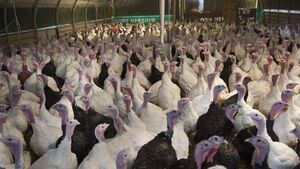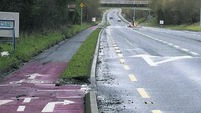Destruction of 5,000 turkeys ‘heartbreaking’ says farmer

Picture used for illustration purposes only
THE man whose turkey farm in County Carlow was struck by bird flu last week has described the forced destruction of 5,000 turkeys as “heartbreaking”.
Speaking to , the farmer, who asked not to be named, said they first discovered that something was wrong on the evening of Wednesday 29 October when a worker feeding the animals noticed 15 birds lying dead in one of the sheds.
“That was a red flag straight away. We thought maybe they got spooked and had a heart attack, or that there was some sort of toxin in the blood,” he said.
When the same worker arrived the following morning, there were another 50 turkeys dead, and the suspicion around the cause of death quickly turned to bird flu.
Arrangements were made by the farm’s veterinarian to bring some of the dead turkeys to the Department of Agriculture’s central research laboratory in Backweston, Celbridge, Co Kildare on the following Friday morning. At that stage, another 200 birds had died, and by the end of the weekend half of the turkeys on the affected farm had perished.
“In the space of five days, 2,000 turkeys had died,” said the farmer. “It is nearly impossible to protect against when it gets into your flock. It’s like wildfire.”
The turkeys were kept on two separate farms in the Tullow area, with the farms about two kilometres apart; however, the birds on one of the farms were still unaffected.
“The other farm was healthy, and it remained healthy, but the department just couldn’t take a risk and had to cull that farm last Wednesday. That was a disaster, but we understand the reason behind it. This thing is so contagious.”
Across the two farms, 5,000 turkeys in total were culled by way of gassing.
“It is devastating. I know there are worse things going on in life with people’s health, but it is heartbreaking.
“My father and grandfather were poultry farmers; the family have been poultry farmers all our lives. It is more than just a financial loss – it’s a lifestyle.
“I was just a chap when I got into turkeys. I started with 100 turkeys when I was 17, and we just built up the operation slowly from there. This will be the first Christmas in 30 years that we won’t be busy selling turkeys.”
The farmer also rears ducks and geese on separate farms over 25 miles away from where the infected turkeys were kept. All birds on those farms have been tested for bird flu and remain clear of the disease.
The origin of the highly-contagious disease is unknown, but it is presumed that it was spread by a wild bird, as all water used on the farm is pumped directly from the mains, and the feed used was tested and returned as all clear.
The turkeys are free range, so it is believed they could have picked up the disease when out foraging.
“It is around every year at this time, because of the migratory birds, and it has been in the country for the last several months. It is rampant in the UK and in Europe now,” said the farmer.
“They’re going to have to bring in a vaccine of some sort for commercial flocks,” he added.
This was the first outbreak of bird flu on a commercial poultry farm in Ireland in more than two years.
A three-kilometre protection zone and 10km surveillance zone are in place around the site. This means that every bird within the 3km zone is tested for bird flu, while sporadic testing is done within the 10km zone.
The Department of Agriculture ordered a nationwide housing order for poultry, which took effect from yesterday (Monday).
This means that all poultry or captive birds must be housed indoors or in such a way that they do not have access to other poultry, captive birds or wild birds.
Contractors employed by the Department of Agriculture have cleared and disinfected the two affected farms, but restrictions will likely remain in place for the next month at least.
The farmer says they don’t know what compensation will look like, as they have never been in this position before; however, the Department has taken all relevant information in terms of the number of birds culled and the different breeds.
The farmer hopes to eventually rebuild the turkey flock back up to previous numbers.
“Hopefully we will be back again next year. A lot of our butchers have been ringing and sympathising with us. We have a great relationship with them, and they will be back again to us.”
The farmer also urged members of the public to remain vigilant if they spot injured or dead birds.
“The only thing I would say is that if people do find dead birds around, report them to the Department of Agriculture straight away,” they said.
“But this is a bigger thing than people finding dead birds. This is an issue for the government to try and contain as best as possible and try to get better prepared for next year.
“Because it will be back next year, there’s no doubt about it.”
If you find dead waterfowl (ducks, geese or swans) or other dead wild birds, report them to the Department of Agriculture at 01 4928026 or contact your nearest regional veterinary office. Further information on avian influenza can be found at www.gov.ie/birdflu.





